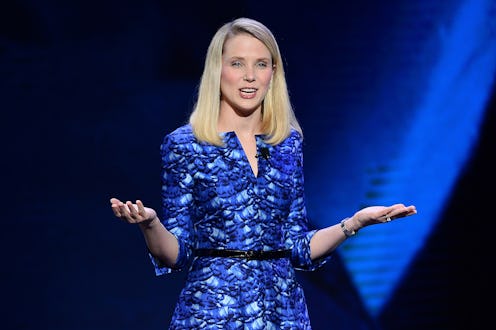News
What Event Saw A Staggering Lack Of Female Guests?
Two years ago, the World Economic Forum tried to increase female participation by implementing gender quotas. The WEF now requires their "100 most important partners" send one woman for every four men to their yearly event in Davos, Switzerland. Unfortunately, it doesn't seem to have worked. At all. As Quartz reports, based on the data it's 66 percent harder to find a woman at the World Economic Forum than almost anywhere else. Last year, the invite-only event was comprised of 17 percent women. And this year? 15 percent.
Part of the reason women are stacked so low at the WEF is that people aren't invited according to demographics, but by their positions. Adrian Monck, head of communications of WEF, deflected questions by remarking that the world of powerful people also had just as little female representation. He told Quartz: "We’re on the front line of reflecting the world as it is, not how we want it to be."
Some of the prominent women attending include CNN's Christiane Amanpour, actress Goldie Hawn, Arianna Huffington, Israel Minister of Justice Tzipi Livni, Queen Rania Al Abdullah of Jordan, and Yahoo's Marissa Mayer — but almost all industries have a severe lack of female representation at the WEF. (You can see Quartz' infographic examining the specific representation of women at the WEF here.)
Out of the countries represented, Turkey saw the highest number of its women attend — at a meager 27.6 percent. America came in at number seven, at a slightly more meager representation of 20.7 percent women.
While the WEF is holding a key event on Jan. 25 that spotlights Facebook's Sheryl Sandberg and the IMF's Christine Lagarde, Jan. 25 is at the tail end of the the WEF. By then several attendees will have already left.
Several writers have expressed dismay at the lack of female representation, including Helena Morrissey at the Financial Times, Dina Medland at Forbes, and The Guardian's Jane Martinson and Aisha Gani. Martinson and Gani, in particular, explained exactly why gender inequality at the WEF matters so much.
There are many who argue that the makeup of a tiny super-elite is irrelevant to the world’s poorest people. More women will make no difference. But there must be some correlation between the fact that the majority of the poorest and most powerless people on the planet are female, while the exact opposite is the case for those at the top, making the decisions. As a reflection of who exerts the power globally, it’s pretty crystal clear.
Interestingly enough, the New York Times wrote an article headlined, "Notable In Their Absence From Davos" — but rather than point out the elephant in the room and say, "Women," they named individual entrepreneurs who "notably" didn't attend WEF. Almost all of those named were men.
